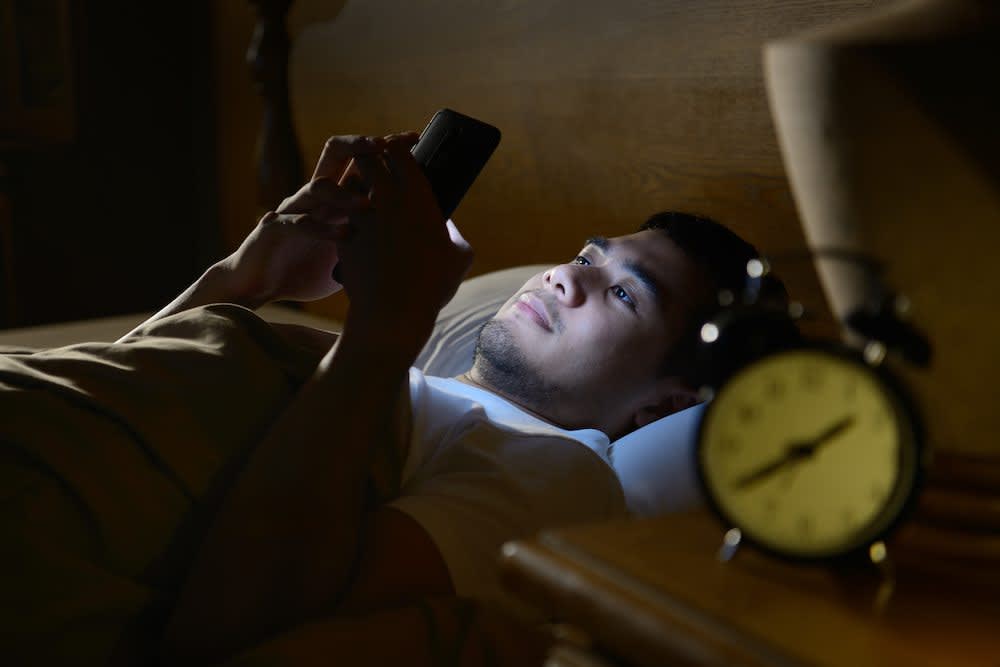Approximately one-third of Americans report averaging fewer than 7 hours of sleep in a 24-hour period. For some of these people, that lack of sleep is the result of a deliberate strategy called revenge bedtime procrastination.
Revenge bedtime procrastination means delaying sleep on purpose to make time for leisure and relaxation activities that don’t fit into a busy day. Sacrificing a few hours of sleep for personal time can seem like a good idea, but there are consequences to not getting enough sleep on a regular basis. Over time, failing to get enough sleep can lead to sleep debt. Research shows that mental, emotional, and physical health suffer as a result of ongoing sleep deprivation.
Learning about revenge bedtime procrastination can help you understand whether you engage in it and whether it’s affecting your health. This knowledge can help you take steps to improve your sleep and put an end to this behavior.
What Is Revenge Bedtime Procrastination?
Delaying sleep for personal time is not a new phenomenon. However, social media has helped bring attention to this behavior and given it a new name, originating in a Chinese expression popularized among overloaded workers.
Revenge bedtime procrastination describes a response to the loss of freedom and sense of frustration from being tied to long, demanding work and school hours. As a way to get revenge on this hectic, stressful pace, people are staying up later to allow for leisure, entertainment, and relaxation. Ultimately, though, revenge bedtime procrastination results in sleep deprivation.
According to researchers, there are three characteristics that define revenge bedtime procrastination:
- A later-than-intended bedtime that reduces the total amount of sleep
- Lack of a valid reason for delaying bedtime
- Knowledge that the decision to stay up late will have negative consequences
There are two broad types of revenge bedtime procrastination, and a person may engage in one or both. In the first type, called bedtime procrastination, a person delays physically going to bed. In the second, called while-in-bed procrastination, a person gets to bed on time but delays sleep to engage in TV watching, video streaming, cellphone scrolling, and similar activities.
Who Is Affected by Revenge Bedtime Procrastination?
Revenge bedtime procrastination may be common, but studying it scientifically is a relatively new field of research. While only a few studies of this phenomenon have been conducted so far, research shows that certain groups of people are more likely to engage in procrastination at bedtime. These include:
- Females: One study found that people who self-reported as female scored higher on a measure of bedtime procrastination compared with people who self-reported as male.
- People With an Evening Chronotype: Chronotype reflects an individual’s circadian rhythm and drives the urge to sleep at certain times of the day. Evening chronotypes, better known as night owls, report more bedtime procrastination than early chronotypes.
- People Who Work Long Hours: Long workdays can deprive people of personal time, leading to later-than-intended bedtimes. People in this situation are often trying to reclaim some time for themselves before going to sleep.
- People Prone to Procrastination: Those who generally procrastinate during the daytime are also likely to engage in bedtime procrastination.
- Students: Students are known to have poor overall sleep habits. Unsurprisingly, researchers have found that students report bedtime procrastination more often than the population at large.
Why Do People Procrastinate at Bedtime?
Increasingly, the demands of work and everyday life make it more challenging to find time for entertainment and relaxation. For some people, bedtime procrastination is a way to gain control and find some freedom from their responsibilities.
Although revenge bedtime procrastination is a new area of study in the field of sleep research, several theories have emerged that help explain it.
One theory suggests that there is an association between self-control and bedtime procrastination. As bedtime approaches at the end of the day, our ability to regulate our behavior is already at its lowest. Sleep-deprived people may have even less ability to exert self-control and adhere to their intended bedtimes. To add to this, people who procrastinate in other areas of life, such as school or work, are more likely to procrastinate at bedtime.
Another theory is that bedtime procrastination is related to chronotypes. Chronotype is the biological inclination to sleep at a certain time of the day, such as being a night owl versus an early bird. Evening types, or night owls, are more likely to procrastinate at bedtime during the week than other chronotypes.
Because many factors likely play a role in bedtime procrastination, further research is needed to understand it more fully.
Effects of Sleep Procrastination
Intentionally staying up late without a valid reason, a hallmark of sleep procrastination, leads to people not getting the recommended amount of sleep. Sleep deprivation can have negative effects on mental, emotional, and physical health.
Mental and Emotional Effects
Sleep deprivation caused by bedtime procrastination can have a range of effects on mental and emotional health, including:
- Mood disorders such as anxiety and depression
- Impaired thinking, memory, and attention
- Diminished sense of judgment and ability to make decisions
- Low energy and decreased libido
Changes to mental and emotional health, along with the excessive daytime sleepiness caused by sleep deprivation, can affect work and academic performance as well as quality of life.
Physical Effects
In addition to the mental and emotional side effects of sleep deprivation, people who do not get the recommended hours of sleep each night may experience a wide range of physical effects, including:
- Daytime sleepiness, which can lead to occupational and motor vehicle accidents
- Increased risk of cardiovascular disease
- Decreased immune response, increasing the risk of catching a common cold
- Metabolic changes that can lead to obesity and type 2 diabetes
How to Stop Revenge Bedtime Procrastination
Making time for yourself and improving your sleep habits are two important steps you can take to put an end to sleep procrastination. These steps may also improve your overall health and well-being.
Make Time for Yourself During the Day
People who find themselves in a pattern of procrastinating at bedtime may benefit from making time for themselves and practicing self-care on a daily basis. Practicing self-care during waking hours can lower stress, improve mental and physical health, increase energy levels, and help people live well in general. You can make time for yourself and practice self-care in many ways, including:
- Eat Healthy and Stay Hydrated: Eating a balanced diet and staying hydrated can help you feel your best. This includes limiting or avoiding alcohol and caffeinated soda, coffee, and tea later in the day as a way to prepare yourself for a good night’s sleep.
- Set Priorities and Goals for the Day: Consider what must get done today and what can wait until tomorrow. This can include cutting extraneous tasks from the day and declining to perform unwanted or unnecessary activities.
- Make Time for Relaxation During the Day: Schedule regular time throughout the day to relax and relieve stress. Some people benefit from wellness programs or phone-based apps that provide guided meditation, breathing, and stretching.
- Set Boundaries Between Work Life and Home Life: The COVID-19 pandemic has blurred the lines between work and home life, leading to longer work days. If you work from home, set a clear work schedule and step away at the end of your work day.
- Make Time for Exercise: Research shows that just 30 minutes of exercise a day can help improve your mood, health, and sleep quality. Even if you can’t carve out one 30-minute block of time for exercise, small amounts count too. Taking quick breaks throughout the day to walk or move your body can add up.
- Keep a Journal: For some, journaling can be a helpful relaxation tool. A journal can be a place to record daily gratitudes you can review each night. You can also write down the stressors of the day in your journal. This may help quiet your mind, reduce stress, and prepare you for a better night’s sleep when the time comes to unwind at the end of the day.
Establish a Bedtime Routine
Making yourself a priority during the day is just one piece of the puzzle of ending bedtime procrastination. Prioritizing sleep is also necessary to put a stop to this habit and return to a healthier sleep routine.
Prioritizing sleep includes improving sleep hygiene. Making just a few changes to your current routine can help you get a better night’s sleep.
- Maintain a Consistent Sleep Schedule: Go to bed and wake up at the same hour on weekdays and weekends. Altering the time you wake up or the time you go to bed by an hour or more can disrupt your body’s circadian rhythm.
- Make Time to Prepare for Bed: Give yourself an hour or so to relax before sleep. This quiet time can include a hot bath or shower, meditation, reading, or using relaxation techniques to help slow your body and mind in preparation for sleep.
- Limit Screen Time Before Bed: Consider your screen time use before bed and how it may be affecting your sleep. Light from electronic devices may signal your brain that it is time to be awake, making it more difficult to fall asleep. Keep devices with screens out of your bed or bedroom as needed.
- Create an Environment Conducive to Sleep: Sleep environment matters when it comes to getting a good night’s rest. Keeping your bedroom dark, quiet, and cool can help improve sleep. Having a comfortable mattress, pillow, and bedding can help as well.
References
Ask the Sleep Doctor
Have questions about sleep? Submit them here! We use your questions to help us decide topics for articles, videos, and newsletters. We try to answer as many questions as possible. You can also send us an email. Please note, we cannot provide specific medical advice, and always recommend you contact your doctor for any medical matters.








































